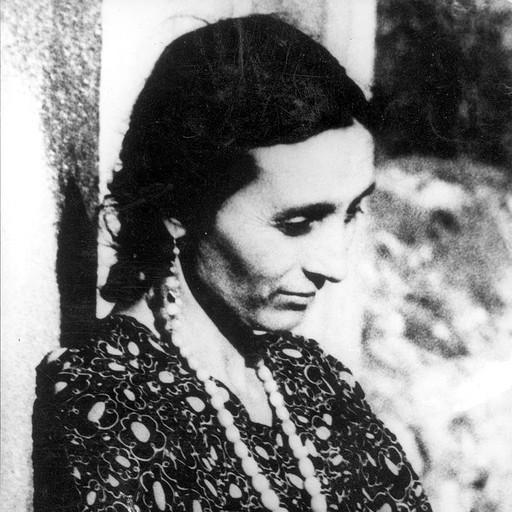Bronisława Wajs (born Zielińska) is widely known under the pseudonym ‘Papusza’ (which means ‘doll’). She was born in Sitaniec, Poland on 17 August 1908. Descended from the Polska Roma, she was the first Romani poet in Poland to publish under her own name.
Before the Second World War, she travelled with her group of Polska Roma through what is today Western Ukraine. She learned to read and write autodidactically. Probably at the age of 19, she married the brother of her stepfather, the harpist Dionizy Wajs. Since she could not have children herself, she adopted a boy whom she named ‘Tarzan’. During the Second World War the group hid in the forests of Volhynia, which the artist described in her work [‘Ratfale jasfa’] [Tears of Blood]. After the war she moved with her group to western Poland, first to Pomerania, then to Żagań and finally to Gorzów Wielkopolski, where she settled.
In the second half of the 1940s the writer and folklorist Jerzy Ficowski joined Papusza’s group. He wrote three books on the culture of Roma in Poland and persuaded Papusza to write down her verses. He translated them into Polish and published three volumes of poetry – the first of which, Pieśni Papuszy – Papušakre gila [Papusza’s Songs] (1956), includes verses in Polish and Romani. Papusza’s work appeared in cultural and literary journals. In 2011 a German-language collection of some of Papusza’s poems was published, translated and edited by Karin Wolff. Papusza’s talent, her songlike poetry and her descriptions of nature as well as her poetic sensibility were all highly praised.
Papusza’s career coincided with the Roma assimilation programme launched by the Communist government in the 1950s. In 1962 she joined the Association of Polish Writers. She won many prizes and received government scholarships. Her artistic work, however, was rejected by Roma. Her collaboration with Ficowski was regarded as betrayal and led to her exclusion from the community. Papusza suffered a mental breakdown and was hospitalised in psychiatric clinics several times. She died in Inowrocław on 8 February 1987.
Works
Wajs, Bronisława [Papusza]. 1956. [Pieśni Papuszy – Papušakre gila. Wiersze w języku cygańskim. Transl. Jerzy Ficowski. Warszawa, Wrocław: Wydawnictwo im. Ossolińskich.
Wajs, Bronisława [Papusza]. 1972. Pieśni mówione. Transl. Jerzy Ficowski. Łódź: Wydawnictwo Łódzkie.
Wajs, Bronisława [Papusza]. 1990. [Lesie, ojcze mój]. Transl. Jerzy Ficowski. Warszawa: Czytelnik.
Wolff, Karin (Hg.). 2011. [Papuszas gesprochene Lieder]. Ausgewählt und übertragen von Karin Wolff. Frankfurt/Oder: Kleist Museum.
Further reading
Bończuk, Leszek. 1996. Papusza czyli wolność tajemna. Gorzów Wielkopolski: Wydawnictwo Rolland.
Bronisława Wajs – Papusza. Biografia i dziedzictwo. 2017. Edited by Dariusz A. Rymar. Gorzów Wielkopolski: Archiwum Państwowe w Gorzowie Wielkopolskim.
Bronisława Wajs – Papusza: Biografie: https://perma.cc/GQJ8-BPMT [= http://culture.pl/pl/tworca/papusza-bronislawa-wajs].
Ficowski, Jerzy. Literatura ludowa i poetka cygańska Papusza. In: Cyganie w Polsce. Dzieje i obyczaje. Warszawa: Wydawnictwo Interpress 1989, 91–105
Ficowski, Jerzy. 1965. Papusza. In: Cyganie na polskich drogach. Kraków: Wydawnictwo Literackie, 252–78.
Ficowski, Jerzy. 1986. Falorykta. In: Demony cudzego strachu. Warszawa: Ludowa Spółdzielnia Wydawnicza, 208–62.
Kamińska, Krystyna. 1992. Papusza czyli wielka tajemnica. Nachwort Krystyna Kamińska. Gorzów Wielkopolski: Gorzowska Oficyna Wydawnicza.
Kledzik, Emilia. 2013. Recording an Oral Message. Jerzy Ficowski and Papusza’s Poetic Project in the Postcolonial Perspective. »Rocznik Komparatystyczny« 2013/4, 207–34.
Kovacheva, Adriana. 2012. Bronisława Wajs Papusza [Stichwort]. In: Wielkopolski Alfabet Pisarek, Poznań: WBPiCAK, 215–31.
Kuźniak, Angelika. 2013. Papusza. Wołowiec: Czarne.
Machowska, Magdalena. 2011. Bronisława Wajs – Papusza. Między biografią a legendą. Kraków: Nomos.
Szott, Mirosława. 2016. Pieśni Papuszy w perspektywie geo- i etnopoetyki. »Konteksty Kultury« 2016/13, 469–86.




